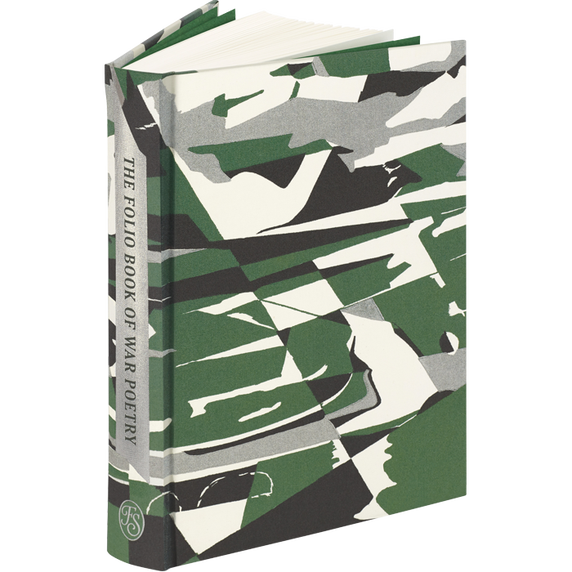
In an exclusive Folio anthology illustrated by Jonathan Lloyd and Neil Gower, former Poet Laureate Andrew Motion gathers together the greatest war poetry, from antiquity to the Cold War and beyond.
Foreword by François Mauriac
Preface by the author
Translated by Marion Wiesel
Illustrated with art by Holocaust artists
Night is one of the first and one of the greatest Holocaust memoirs. The new Folio Society edition is illustrated with art by survivors and witnesses and is published alongside Elie Wiesel’s Nobel Prize acceptance speech.
Night is Elie Wiesel’s terrifying and intimate account of his time in Auschwitz and Buchenwald. It is also an incredible historical document; essential reading for a generation removed from the suffering inflicted by humankind against its own during the Second World War. But despite the subject matter, Wiesel’s narrative is beautiful and the measured language highlights the terrible dichotomy between humanity’s creative and destructive capabilities.
Never shall I forget that night, the first night in the camp that turned my life into one long night seven times sealed.
Never shall I forget that smoke.
Never shall I forget the small faces of the children whose bodies I saw transformed into smoke under a silent sky.
Bound in blocked cloth
Set in Jansen
168 pages
Frontispiece and 10 colour illustrations
Blocked slipcase
8˝ x 5¼˝
Wiesel was 15 years old in 1944 when his family was transported from their hometown of Sighet in Hungary, to Auschwitz in German-occupied Poland. His mother and younger sister were killed on arrival and he was left with his father to adjust to the brutal regime of camp life. The horrors of the Holocaust are omnipresent and yet survival is the recurring theme – the reserves of strength that can be called upon to cling on to life against the greatest of odds. The young Wiesel essentially switches roles with his father, taking on the mantle of protector and provider in his desperate efforts to keep them both alive.
We had been a hundred or so in this wagon. Twelve of us left it. Among them, my father and myself. We had arrived in Buchenwald.
‘Elie Wiesel was not just the world’s most prominent Holocaust survivor, he was a living memorial.’
- Barack Obama
Following the liberation of Buchenwald by American Forces in 1945, Wiesel moved to Paris, studied at the Sorbonne and subsequently worked as a journalist. It was following an interview with French novelist François Mauriac that Wiesel revisited the manuscript he had written in his native Yiddish and felt compelled to publish Night. Mauriac’s fascinating foreword tells of the struggle to secure a publisher and how the book was eventually released in French and then in English translation. The text was revised by Wiesel’s wife Marion in 2006 and it remains the best-known Holocaust memoir, a powerful reminder ‘lest we forget’.
Wiesel was honoured with the Nobel Peace Prize in 1986 and his moving acceptance speech is published alongside his memoir. To illustrate the edition, we sourced paintings and drawings from Holocaust archives, including Yad Vashem, the World Holocaust Remembrance Center. These include Thomas Geve’s chilling Culture – painted by the teenager while he gained sufficient strength to leave the liberated Buchenwald; and Roll Call at Auschwitz by Mieczyslaw Koscielniak, an artist who smuggled over 300 drawings out of the camp so the rest of the world would know something of the horror.
The stark binding design encourages contemplation and the blocked title is replicated on the slipcase, which is the colour of approaching night.
Elie Wiesel (1928–2016) was a Romanian-born Jewish novelist, journalist, human rights activist and Holocaust survivor. He was fifteen years old when he and his family were deported by the Nazis to Auschwitz concentration camp in Poland in 1944. Liberated from Buchenwald in 1945 by Allied troops, he was taken to Paris where he studied literature, philosophy and psychology at the Sorbonne and became a journalist, yet for years he remained silent about what he had endured as an inmate in the camps. During an interview with the distinguished French writer François Mauriac, Wiesel was persuaded to end that silence. He subsequently wrote his memoir La Nuit (Night), first published in 1958, and which has since been translated into more than thirty languages. His other works are on Jewish subjects, most focusing on the Holocaust, and include Dawn (1961), Legends of Our Time (1966), A Beggar in Jerusalem (1968), The Testament (1980), and two volumes of his memoirs All Rivers Run to the Sea (1995) and And the Sea is Never Full (1999).
Wiesel was also a teacher and from 1972 to 1976 he served as Distinguished Professor at the City University of New York and became the Andrew Mellon Professor of the Humanities at Boston University in 1976, where he taught in both its religion and philosophy departments. In 1978, President Jimmy Carter appointed Elie Wiesel as Chairman of the President’s Commission on the Holocaust and in 1980 he became the Founding Chairman of the United States Holocaust Memorial Council. In his later life Wiesel emerged as a political activist and humanitarian and was awarded the Nobel Peace Prize in 1986.
